Witness the dramatic tale of rivalry, desperation, and divine providence in Genesis 30's poignant family saga.
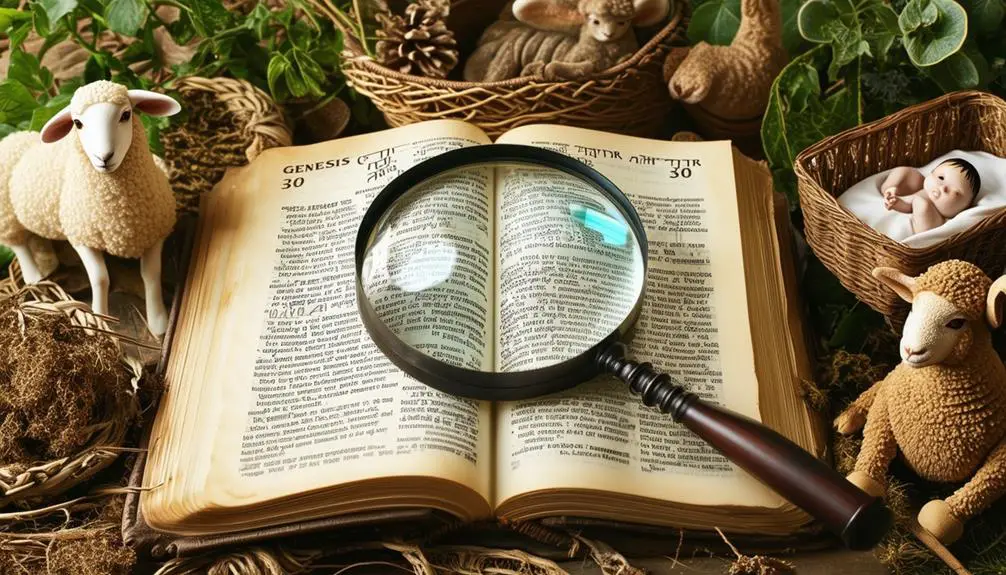
Bible Study – The Book of Genesis – Chapter 30 – Summary and Analysis
In Genesis 30, you'll explore the intrigues of Jacob's domestic life, particularly his wives Leah and Rachel's rivalry. This chapter reveals the desperation of Rachel's barrenness and Leah's longing for Jacob's love. It's an examination of familial discord, yet acknowledging God's providence as Jacob prospers despite these challenges. Here, societal norms of the era are reflected, for example through the acceptance of surrogate mothers. You'll find symbolism richly woven into the narrative, with vivid metaphors providing insights into the characters' experiences. When you step deeper into this chapter, you'll uncover even more layers of meaning and relevance for modern life.
Key Takeaways
- Genesis 30 presents a narrative of intense rivalry between sisters Leah and Rachel, with childbearing used as a means of securing love and status.
- The theme of divine intervention is notable, with God responding to the women's pleas, and Jacob's prosperity being attributed to God's providence.
- The chapter provides insights into societal norms of the era, including surrogate motherhood and competitive childbearing within patriarchal societies.
- It explores Jacob's transformation from a trickster to a man of faith, depicting spiritual growth through character development.
- Genesis 30 contains symbolic dream interpretations, such as striped, speckled, and spotted sheep denoting divine intervention, and peeled branches signifying human effort.
Genesis 30: An Overview

Delving into Genesis 30, you'll find a complex narrative steeped in familial strife, divine intervention, and intricate societal norms of the time. The chapter reveals the theme of Jacob's Prosperity, which is deeply intertwined with the Barrenness theme, and these themes provide a lens to interpret the events and the characters' motivations.
Jacob's Prosperity is evident in his growing wealth and status, despite his challenging relationship with Laban. You'll notice that his prosperity isn't attributed solely to his cleverness or hard work. It's shown as a direct result of divine intervention, emphasizing the pivotal role of faith in this narrative.
Conversely, the Barrenness theme is manifest in Rachel's inability to conceive, a condition viewed as a curse in the patriarchal society of the time. This theme adds a layer of tension and desperation to the story, as Rachel seeks to find her worth and identity through motherhood.
Key Characters Analysis
In analyzing the key characters, you'll find that each one's actions, decisions, and motivations deeply influence the narrative's trajectory and themes. Jacob's transformation stands central to this chapter. Initially, he's a trickster who supplants his brother Esau and deceives his father Isaac. However, through a series of trials and tribulations, Jacob's character evolves, and he becomes a man of faith and integrity. His transformation is a proof of God's grace and the power of redemption.
Bilhah and Zilpah's roles, though less prominent, are still significant. They are the handmaids of Rachel and Leah respectively, who bear children on their behalf due to their mistress's barrenness. Their characters highlight the social norms of the time, where surrogate motherhood was an acceptable practice to secure lineage continuation. Despite their low social standing, they contribute to the formation of the twelve tribes of Israel.
Decoding the Narrative
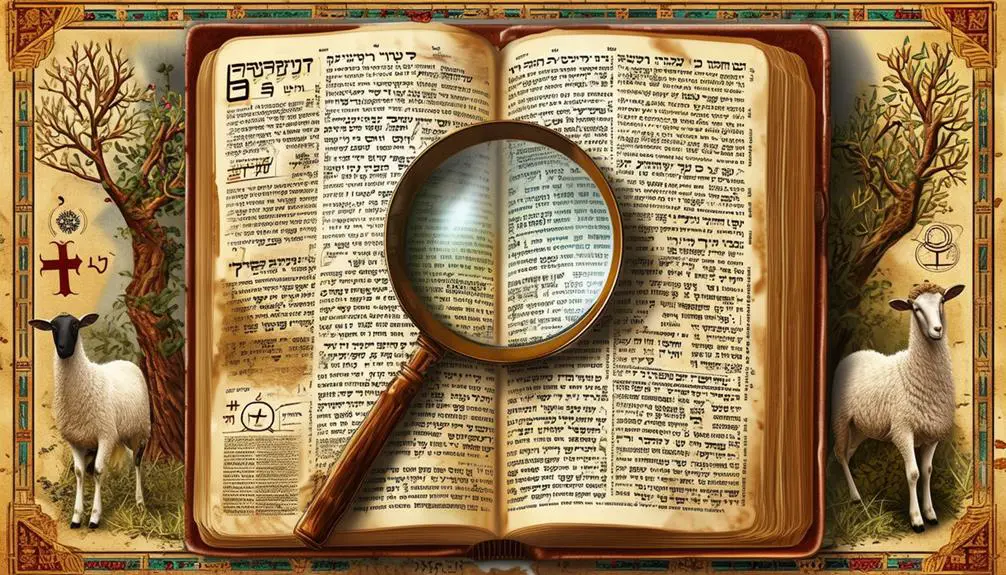
Moving forward with our analysis, let's now decode the narrative of Genesis Chapter 30, examining the underlying themes and symbolism woven into the tale. The narrative structure is uniquely designed, combining historical context with complex interpersonal relationships.
This chapter is primarily centered on the competitive childbearing between Leah and Rachel, and the dynamics of their relationship within the historical context of ancient patriarchal societies.
To dissect the narrative further, consider the following points:
- The use of nature (mandrakes, livestock) as bargaining tools for power and favor, reflecting societal norms of the time.
- The repeated motif of childbearing as a means of securing status and love within the family.
- The depiction of God's intervention and mercy in response to the women's pleas.
- The introduction of new characters (Bilhah, Zilpah) who further complicate the family dynamics.
Each of these elements contributes to a narrative structure that is fraught with tension and drama, underpinned by the historical context of the era. By understanding the narrative, you're not only gaining insight into biblical stories, but also the cultural and societal norms of ancient times.
Themes Uncovered
Unearthing the themes in Genesis Chapter 30, you'll find the narrative is rich with symbolism and deeply rooted in the cultural and societal norms of the era. There are two prevailing themes in this chapter: Divine Providence and Spiritual Growth, which intertwine seamlessly throughout.
Let's begin with Divine Providence. This theme is manifest in the belief that God is actively orchestrating events for the good of His people. You'll notice this in Jacob's increasing prosperity, despite Laban's deceptive practices. God's providence is not just about physical blessings, but also about protecting His people from harm and injustice.
Next, the theme of Spiritual Growth is evident in Jacob's character development. Initially, he's seen as a crafty individual, relying on his wit to succeed. However, as the chapter progresses, you'll observe a shift in his reliance from his own cunning to faith in God's providence. This transformation signifies the spiritual growth that takes place within him, illuminating the understanding that true success comes not from self-reliance, but from dependence on God.
Leah and Rachel: A Rivalry
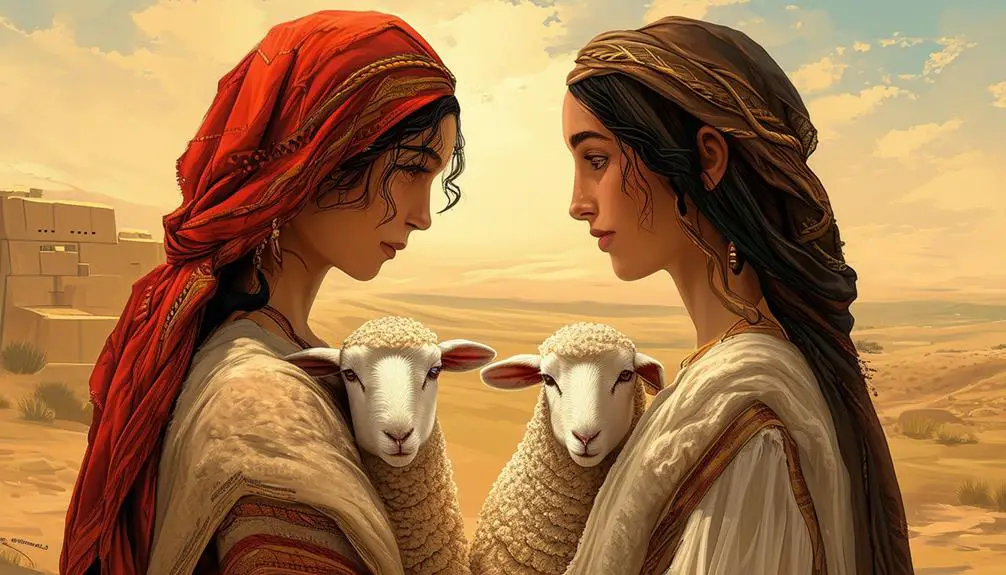
Amidst the backdrop of divine intervention and spiritual growth, you'll find an intense rivalry brewing between Leah and Rachel, two sisters vying for the affections of one man, Jacob. This sibling rivalry, intricately woven into the fabric of Genesis 30, offers deep insights into marital dynamics of the era, with each sister endeavoring to achieve her own version of victory.
Examining the rivalry closely, you'll notice:
- Leah, the older sister, often overlooked due to her 'weak eyes,' compensates by bearing more children. Her struggle to win Jacob's love through procreation is both poignant and profound.
- Rachel, the younger and more loved, battles barrenness, a curse in their society. Her desperation to bear children is a persistent theme.
- The use of maidservants Bilhah and Zilpah as surrogates exacerbates the rivalry, further complicating the family dynamics.
- The exchange of mandrakes, believed to promote fertility, symbolizes the sisters' intense competition.
Divine Intervention Illustrations
In the intricate narrative of Genesis 30, you can't help but notice the hand of divine intervention guiding the events, often in surprising and unexpected ways. This divine orchestration is evident in the way God intervenes in the lives of Jacob, Leah, and Rachel, often through miraculous providence.
Consider the incident of the speckled and spotted sheep and goats, for example. Through what seems like a mundane agreement between Laban and Jacob, God miraculously multiplies Jacob's flock, reinforcing the promise He made to Abraham. This isn't a random occurrence but a clear demonstration of divine orchestration, a manifestation of God's sovereignty and His active role in human affairs.
Also, amidst the rivalry between Leah and Rachel, God's intervention is evident. He opens Leah's womb while Rachel remains barren. This isn't a mere biological happening but a divine response to their prayers and actions. The births and the naming of the children are more than just natural events; they are signs of divine providence, foreshadowing the future of the twelve tribes of Israel.
Symbolism in Genesis 30
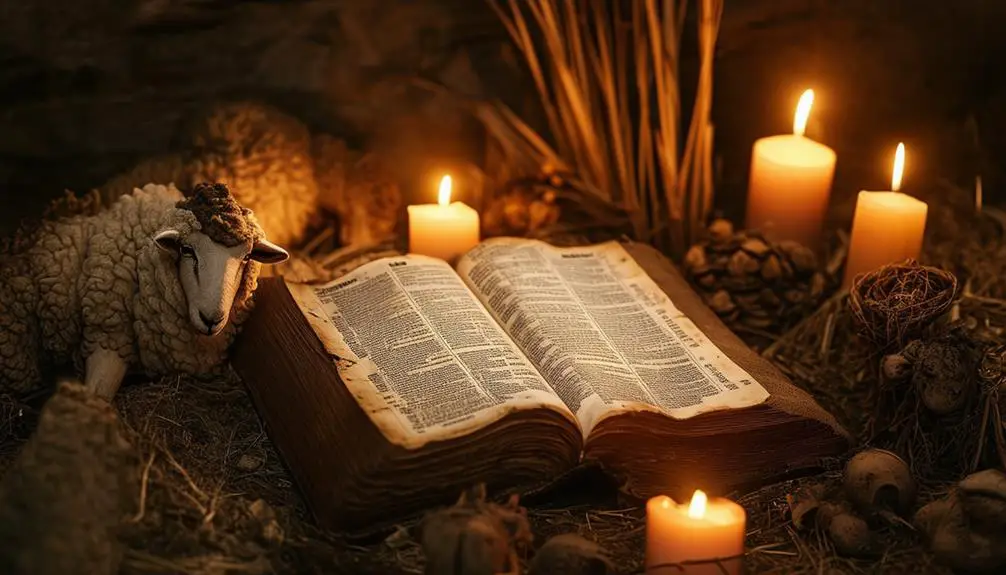
In your exploration of Genesis 30, you'll encounter intricate layers of symbolism that offer deeper insights into the narrative. Particularly, you'll analyze the complex rivalry between Rachel and Leah, which is rich with metaphorical implications. Additionally, the interpretation of dreams in this chapter offers a unique window into the divine communication methods of the period.
Understanding Genesis 30 Symbolism
Delving into the symbolism of Genesis 30, you'll find a rich tapestry of metaphors and allegory that underscore the chapter's key themes and messages. Genesis Allegories and Biblical Metaphors are deeply intertwined in this narrative.
The symbolism in this chapter is key to understanding its context and narrative. Let's explore some of these symbolic elements:
- The speckled and spotted sheep represent the blessings of God, despite human manipulation.
- The mandrakes symbolize a man's longing for God's blessing and divine intervention.
- The rivalry between Rachel and Leah is a metaphor for spiritual conflict.
- Jacob's prosperity despite Laban's deceit stands as an allegory of God's faithfulness.
This analysis helps you decode the intricate symbolism and allegories intertwined in Genesis 30.
Rachel and Leah's Competitions
One of the most compelling symbolic narratives in Genesis 30 is the intense competition between Rachel and Leah. This rivalry illustrates complex sibling dynamics, reflecting societal values of the time. You'll see that their fertility struggles aren't just personal battles, they're metaphors for power and status. Leah, the less-loved but fertile wife, consistently bears children, symbolizing her societal worth despite Jacob's indifference. Conversely, Rachel, Jacob's preferred wife, is initially barren, representing the disconnect between personal affection and societal value. Their competition escalates, each using their maidservants to bear children, indicative of the desperate measures one might resort to for recognition. Through their struggles and rivalry, Genesis 30 offers deep insight into the societal pressures that fueled their actions.
Dream Interpretations in Genesis
You'll find that Genesis 30 isn't just about sibling rivalries and fertility struggles; it's also rich with dream interpretations that hold profound symbolic meaning. When you explore this chapter, you'll encounter dream symbolism and prophetic visions that add depth to the narrative.
- The striped, speckled, and spotted sheep symbolize God's divine intervention in Jacob's prospering.
- Jacob's peeled branches in the water troughs represent his strategic human effort.
- The mating of the strong animals in front of the branches symbolizes the mixing of divine and human efforts.
- Rachel's mandrakes, though not a dream, symbolize a desperate desire for fertility.
These symbolic elements aren't mere storytelling devices; they're profound metaphors that provide insight into the characters' experiences and God's mysterious workings.
Contemporary Relevance
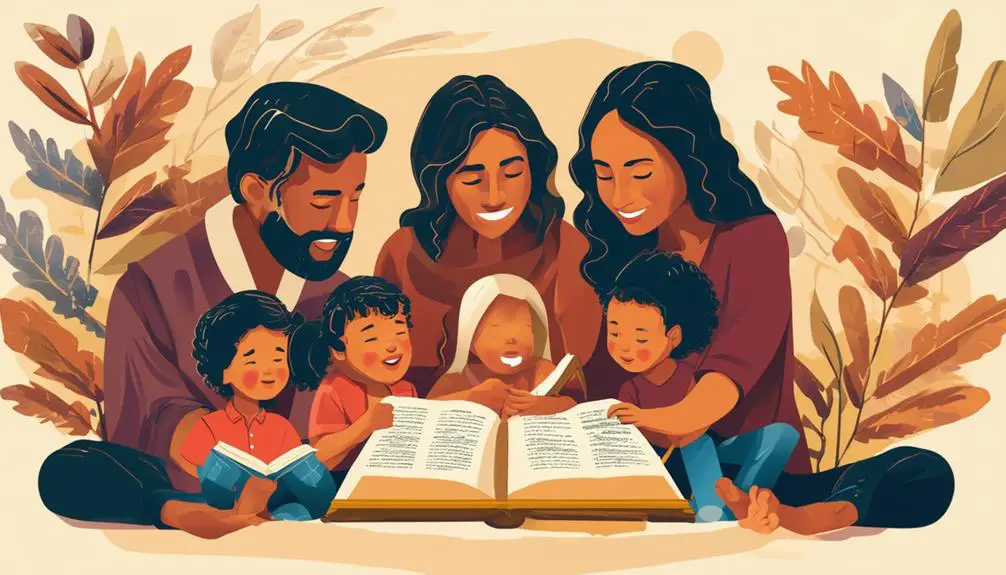
You might wonder how Genesis 30, a biblical chapter centuries old, could still resonate in this modern age. Let's consider the lessons to be gleaned from this narrative and how they can be applied in contemporary life. Further, we'll critically analyze how the themes and events of this chapter have shaped societal norms and expectations, underlining its enduring impact.
Modern Lessons From Genesis
When exploring the contemporary relevance of Genesis, it's important to emphasize that the narratives contain lasting lessons that still resonate in today's society. Genesis teachings and biblical principles provide a framework for understanding various aspects of human interaction and personal growth. Here are few modern lessons we can learn:
- *Humanity's Stewardship*: Genesis teaches us about our responsibility to care for the earth and its creatures.
- *Importance of Obedience*: The story of Adam and Eve emphasizes the consequences of disobedience.
- *Value of Perseverance*: Characters like Jacob and Joseph demonstrate resilience in the face of adversity.
- *Significance of Forgiveness*: The narrative encourages reconciliation and forgiveness.
Analyzing these principles in Genesis, we see their timeless relevance in shaping moral and ethical standards in our society today.
Genesis' Impact on Society
Undoubtedly, Genesis' influence permeates contemporary society, shaping our collective conscience and guiding societal norms and values. This religious influence, deeply entrenched in our culture, impacts how we interpret right from wrong. It's not merely about faith; it's about an ethical framework that dictates our societal behaviors. The narratives in Genesis have been used to justify societal norms, often serving as moral compasses for individuals and communities alike. Yet, the power of Genesis goes beyond the moral sphere. The book's themes of creation, promise, and redemption resonate with universal human experiences, providing a model for resilience and hope. Hence, Genesis isn't merely a religious text; it's a cultural cornerstone, a significant force shaping our societal ethos.
Lessons for Modern Life
In the course of analyzing Genesis Chapter 30, it's apparent that the narrative offers profound lessons for modern life, reflecting timeless themes of human nature and societal structures. Through biblical applications, we can draw insights about modern faithfulness, family dynamics, and the power of prayer.
- The complexities of relationships as seen in Jacob's polygamous family can serve as a cautionary tale for modern families, emphasizing the importance of harmony and respect.
- The concept of faithfulness is highlighted throughout the chapter. Despite adversity, Jacob remains faithful to God, demonstrating a model of modern faithfulness that can be emulated in today's society.
- The power of prayer and divine intervention is evident in the lives of Rachel and Leah. In a world filled with uncertainties, their story serves as a reminder of the influence of prayer and faith.
- The role of women in society is a prominent theme in this chapter. The struggles of Leah and Rachel shed light on the societal pressures women face, a timeless issue that persists today.
These lessons are not just historical or religious artifacts, but relevant teachings for contemporary life.
Frequently Asked Questions
What Are the Original Hebrew Words Used in Genesis 30 and Their Meanings?
You're asking about the original Hebrew words used in Genesis 30 and their meanings. It's key to understand the Hebrew language influence to grasp the depth of the text. Each Hebrew word carries a cultural context significance that might be lost in translation. Detailed analysis of the original text is required to fully appreciate the nuances and layers of meaning. A scholar's study would provide insights into this rich, complex language.
How Does Genesis 30 Relate to the Other Books in the Bible?
You may wonder how Genesis 30 ties into the Bible's other books. Genesis' contextual relevance lies in its foundational stories, setting the stage for themes explored later. The prophetic undertones in Genesis, like Jacob's sons becoming the twelve tribes of Israel, foreshadow key events in subsequent books. Understanding Genesis 30, thus, provides a deeper comprehension of the Bible's overall narrative.
Are There Any Lost or Disputed Verses in Genesis 30?
You're asking if there are contested or lost verses in Genesis 30. While it's had significant cultural influence, no specific verses in Genesis 30 are widely disputed or lost. That's not to say it's free from debate. Like any biblical text, interpretation varies. However, every verse is accounted for, each contributing to Genesis 30's impact on shaping religious, ethical, and societal norms.
What Are Some Common Misconceptions About Genesis 30?
You might think Genesis 30's symbolism is straightforward, but it's often misunderstood. Some believe it's merely about family rivalry or wealth. However, it's deeper, representing divine intervention and faith. Rachel's infertility isn't just about her personal struggle, but reflects a broader theme of God's timing and purpose. It's not a simple tale of envy and deceit, but a complex narrative of faith, divine intervention, and human frailty.
How Has the Interpretation of Genesis 30 Evolved Over Time?
Understanding the interpretation of Genesis 30 has likely shifted due to contextual evolution and cultural influence. Just as a river's course alters over time, so has the interpretation of this text. This change isn't arbitrary, it's shaped by the societal and cultural currents of each era. It's crucial to remember, this isn't a dilution of the message, but a reflection of our evolving understanding and application of these ancient teachings in a modern world.

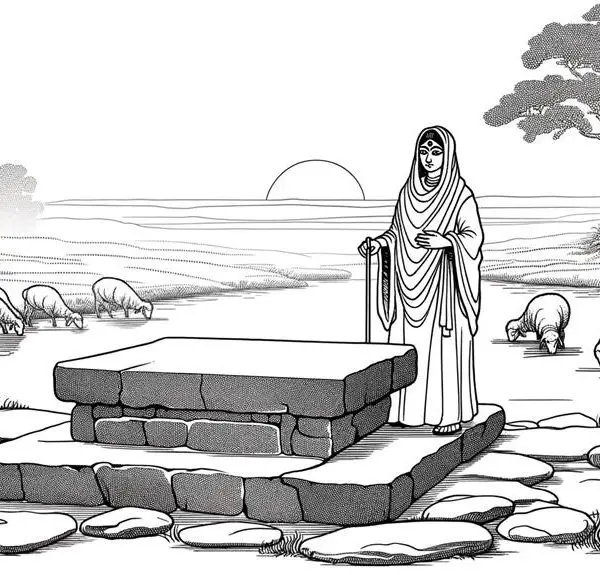

Sign up